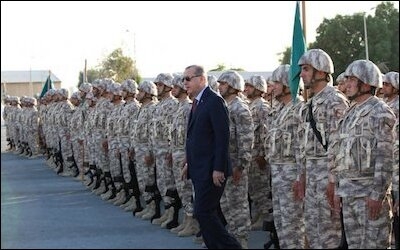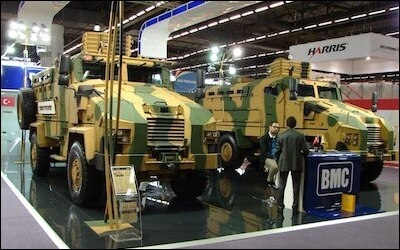Turkey and Qatar: Love in Bloom by Burak Bekdil
Few Qataris who fought the Ottoman colonialists to gain their independence in 1915 and end the 44-year-long Turkish rule in the peninsula would ever have imagined that their grandchildren would become Turkey’s closest strategic allies.
Qatar, a tiny but extremely wealthy sheikdom, has a constitution based on sharia (Islamic religious law), while Turkey’s constitution is strictly secular (officially, if not in practice). In Qatar, flogging and stoning—unthinkable in Turkey—are legal forms of punishment. In Qatar, apostasy is a crime punishable by death, while in Turkey it is not a criminal offense.
But the ideological kinship between the two Sunni Muslim countries, which is based on passionate political support for Hamas and the Muslim Brotherhood (and a religious hatred of Israel), seems to have produced a bond that threatens Western interests.
 Erdogan visiting Turkey’s military base in Doha, Qatar, November 15, 2017. Erdogan visiting Turkey’s military base in Doha, Qatar, November 15, 2017. |
In 2014 Turkey and Qatar signed a strategic security agreement that gave Ankara a military base in the Gulf state, which is already home to the largest US air base in the Middle East (al-Udeid). Turkey stationed some 3,000 ground troops at its Qatari base in addition to air and naval units, military trainers, and special operations forces.
In 2017, in a Sunni vs. Sunni drama in the Gulf, a Saudi-led coalition imposed a blockade on Qatar accusing it of supporting terrorism and fostering ties with the rival Shiite force, Iran. Turkey immediately rushed to Qatar’s aid, sending cargo ships and hundreds of planes loaded with food and essential supplies to break the blockade. Ankara also deployed more troops at its military base in Qatar in a gesture suggesting that it would assist in protecting the country militarily.
2018 was payback time for the sheikdom. Doha pledged $15 billion in investment in Turkish banks and financial markets when Turkey’s national currency lost 40% of its value against major Western currencies in the face of US sanctions. In other words, one US ally in the Middle East was financially helping another US ally evade US sanctions.
The Qatari favor to the Turkish nation was followed by a massive gift to its leader when Qatar’s emir, Tamim bin-Hamad al-Thani, gave Turkish president Recep Tayyip Erdoğan a Boeing 747-8 aircraft, the world’s largest and most expensive private jet, priced at around $400 million.
 Qataris own a 49% stake in BMC, one of the largest military vehicle manufacturers in Turkey. Qataris own a 49% stake in BMC, one of the largest military vehicle manufacturers in Turkey. |
The Turkish-Qatari love affair had its tender moments in defense industry cooperation too. A Qatari investment fund bought a 49% stake in BMC, a Turkish armored vehicles manufacturer, whose Turkish partners are notorious Erdoğan cronies. In a bidding result that surprised no one, BMC won the serial production contract for the Altay, the indigenous, next-generation Turkish main battle tank in the making. Under the multi-billion-dollar deal, BMC will eventually produce more than 1,000 Altays. (In a controversial move, Erdoğan’s government also allocated a military-run tank facility to BMC.) In one of several defense industry deals, Havelsan, a state-controlled military software company in Ankara, signed a partnership agreement with Al Mesned Holdings in Qatar for a joint venture that will specialize in cyber-security solutions for the sheikdom.
So far so good. But Turkey’s fundamental economic imbalances persist and are likely to worsen in the post-pandemic era. The unemployment rate, officially 13.6% in February, is forecast to reach 17.2% by the end of the year. The national currency has depreciated as sharply as it did during the 2018 crisis: One US dollar was traded at 7.26 Turkish liras in mid-May 2020 versus 3 liras in September 2016. Following a 20% rise within a year, Turkey’s gross foreign currency liabilities have reached $300 billion (net foreign liabilities are at $175 billion). Mismanagement and palliative efforts to keep the lira afloat has caused the Turkish Central Bank to burn through $65 billion in reserves since January 2019.
In order to stop the lira’s slide and provide Turkish banks with the foreign liquidity they need, the Central Bank has been desperately but unsuccessfully seeking currency swap agreements* with the world’s major economies, including with the Federal Reserve Bank, the Bank of Japan, and the Bank of England.
All this financial misfortune comes at a time when the Turkish economy is poised to deteriorate further due to potential US sanctions. Washington has warned of sanctioning Turkey as part of the Countering Adversaries of America Through Sanctions Act (CAATSA) for having acquired the Russian-made S-400 long-range air and anti-missile defense system. The sanctions will go into effect if Ankara activates the Russian system. Additionally, a US court has threatened to sanction, at the magnitude of billions of dollars, a Turkish government lender, Halkbank, for evading US sanctions on Iran. If those sanctions go into effect, Turkey’s economic troubles could turn into an existential financial/political crisis that would threaten Erdoğan.
Erdoğan knew where to turn for help. On May 20 the Turkish Central Bank announced that it had tripled its currency swap agreement with Qatar,* meaning it had secured much-needed foreign currency funding. The deal raised the 2018 swap agreement’s $5 billion limit to $15 billion and immediately boosted the lira.
Once again, US ally Qatar has rushed to offer financial aid to US ally Turkey to help it withstand US sanctions. Just as it did in 2018, Qatar has at least partially thwarted US sanctions.
Ally cohesion? Not really.
Burak Bekdil is an Ankara-based political analyst and a fellow at the Middle East Forum
Comments are closed.
